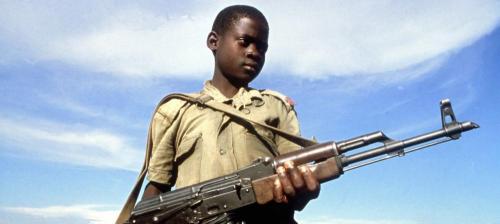
https://childrenandarmedconflict.un.org/press-release/international-day-...
New York – As we mark the International Day against the Use of Child Soldiers, tens of thousands of boys and girls are associated with armed forces and groups in conflicts in over 20 countries around the world.
“Again this year, the multiplication of conflicts and the brutality of tactics of war have made children extremely vulnerable to recruitment and use,” said Leila Zerrougui, the Special Representative of the Secretary-General for Children and Armed Conflict.
In the most recent Annual report of the Secretary-General on children and armed conflict, 56 of the 57 parties to conflict identified for grave violations against children are named because they are recruiting and using child soldiers.
Children are sent to the frontlines as combatants, but many are also used in functions that put their lives in danger such as cooks, porters, spies and informants. During their association with armed groups or forces, children are exposed to high levels of violence. They are witnesses, victims or forced to commit acts of brutality. In addition, a majority of girls, but also boys, are victims of rape and sexual violence. When they are captured or arrested for alleged association with armed groups, too often, children are not treated primarily as victims and denied the protection guaranteed by international norms and standards of juvenile justice.
“Children who are released or escape often have a hard time finding their place in society, or can even be rejected by their communities. We must make it our common responsibility to ensure sufficient resources are available for reintegration to provide psychosocial support as well as education and vocational training. This is crucial to their future and to build peaceful societies,” said Leila Zerrougui.
Twenty years of work to protect boys and girls in conflict
In 1996, the mandate of the UN Special Representative for Children and Armed Conflict was created following the realization that children were the primary victims of armed conflict.
Twenty years later, the international community’s engagement has resulted in a strong framework and concrete tools to engage with parties to conflict and address the violations committed against children during conflict.
“We still face huge challenges to protect children in times of war, but our work and advocacy has led to an emerging consensus among the world’s nations that boys and girls do not belong in national security forces in conflict or in any armed group,” declared the Special Representative
The Optional Protocol to the Convention on the Rights of the Child on the involvement of children in armed conflict, now ratified by 162 state parties, has played a crucial role to bring about this consensus. Leila Zerrougui invites all Member States who have not yet ratified the Optional protocol to do so as soon as possible.
Children, Not Soldiers
In 2014, the campaign Children, Not Soldiers was launched by the Special Representative and UNICEF to support the last eight states –Afghanistan, Chad, Myanmar, Somalia, South Sudan, Sudan and Yemen- identified by the Secretary-General for the recruitment of children in their security forces.
So far, Chad has put in place all the measures required to prevent the recruitment of children and was removed from the Secretary-General’s list. The campaign has led to tangible progress and helped to significantly reduce the number of verified cases of recruitment and use of children in most of the countries concerned by Children, Not Soldiers.
This year, work continues to support the seven remaining countries to put in place the required measures to protect boys and girls from recruitment and use. The momentum generated by the campaign has also created opportunities for engagement with non-state armed groups active in countries concerned by Children, Not Soldiers and beyond. The FARC-EP’s commitment to end the recruitment of children announced earlier this week is one such example.
“I invite everyone to start thinking about child soldiers as boys and girls we collectively failed to protect,” said Leila Zerrougui. “We have an opportunity to end the recruitment and use of children in conflict. It is now our common responsibility to ask for urgent action to end grave violations against children and to dedicate the necessary attention and resources to reach our objective.”
Additional information on the recruitment and use of children:
In Afghanistan, there is progress to end the recruitment and use of children in national security forces, but children continue to be recruited by armed groups such as the Taliban.
In the Central African Republic, children continue to be subjected to grave violations by all parties to the conflict. The UN has documented several thousand children recruited and used by armed groups since the beginning of the conflict. Children have been used in many ways. They have been sent to the frontlines as combatants, as informants or porters. Girls have been used for sexual purposes.
In the Democratic Republic of the Congo, there is steady progress in the implementation of the Action Plan signed with the United Nations to end the recruitment and use of children by the national security forces. Despite this positive development, children continued to be recruited and used by armed groups, most notably in eastern DR Congo. It is estimated that the ranks of some armed groups are composed of about 30% of children.
In Iraq and Syria, with the proliferation of armed groups and advances by ISIL, children remainvulnerable to recruitment. Reports have been received of armed groups targeting children as young as seven years of age, and forcibly recruiting children through coercion of family members and abductions.
In South Sudan, children continue to suffer the consequences of a brutal conflict and most of the progress previously achieved to protect them has been erased. We now see high levels of recruitment and use and call on all parties to take tangible action to honour their commitment to protect children.
In Yemen, the recruitment and use of children by all parties to the conflict has become widespread since the escalation of conflict in March 2015.
###










Add new comment